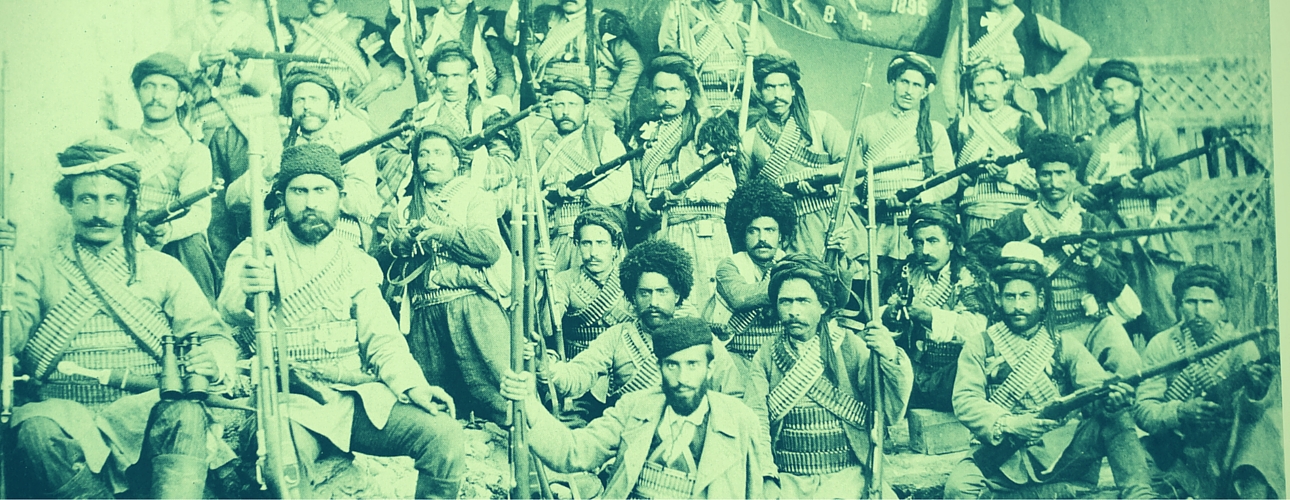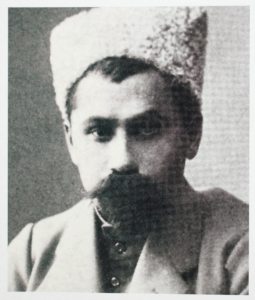
Dro [1884–1956]

Born in Surmalu (present-day Igdir, Turkey), in the Yerevan governerate of the Russian Empire, Dro was one of the most daring avengers and military figures of Dashnaktsoutiun. He attended the local parish school, then a Russian high school in Yerevan.
He joined the ARF in 1903, during Russian attempts to confiscate Armenian Church properties—a move that the ARF actively opposed.
Dro was tasked by the ARF Central Committee of Baku to punish those responsible for inciting the Tatar (Azeri) mobs and touching off the Armeno-Tatar confrontations in 1905. Georgian noble Prince Nakashidze, who had been vice-governor of Yerevan and participated in the seizures of Armenian Church properties, was appointed governor of Baku in 1904 and encouraged Tatar atrocities against the Armenians of the city. In May 1905, Dro assassinated Nakashidze in Baku.
Later, in 1907 in Alexandropol, he and Martiros Charoukhchian assassinated General Alikhanov, who had been in Nakhijevan in 1905 during Tatar attacks against Armenians and later led a Cossack division in Armenia. In 1908, Dro settled in Bayazit, in the guise of a merchant, to supervise arms shipments.
In 1915 Dro commanded the Second Armenian Volunteer Regiment. Later, he played a vital role in the decisive battles of 1918, gaining the victory at Bash Abaran, which, along with the victories at Sardarabad and Gharakilise, paved the way for the founding of the Armenian Republic of 1918.
Dro was a general in the armed forces of the Armenian Republic and served as minister of war in the Vratsian cabinet. After the Sovietization of Armenia, he was exiled to Moscow, then made his way to Romania.
During the Second World War, his efforts to protect Armenians in areas under German occupation, as well as Armenian prisoners of war in Nazi camps, helped save thousands of Armenian lives.
Dro settled in Lebanon in 1947. He died in Boston, in 1956, at the age of 73.
His remains were taken to Armenia for final burial in Aparan (Bash Abaran), on May 28, 2000, as part of the commemoration of the 82nd anniversary of the First Republic of Armenia.
Death would have been unavoidable had it not been for the dedication of his comrades-in-arms. The command of the regiment passed on to Armen Garo. The wounded Dro was taken to Igdir, suffering unspeakable difficulties and torment, and from there to Tiflis, to the Aramian hospital, where he underwent surgery and treatment. But the bullet stayed in his lungs, accompanying him for the rest of his life…. It was during those days [the Russo-Turkish War], in the beginning of December, that Tsar Nicholas came to Tiflis. He also visited the military hospitals. Escorted by Mayor [Aleksandr] Khatisian and doctors and nurses, he entered the room in which Dro lay.
Khatisian informed the Tsar about Dro’s person and the circumstances of his being wounded. The Tsar, delighted, congratulated Dro, and bestowing him with the cross of bravery, asked: “Where did you learn the military arts?”
“In revolution, your highness,” Dro answered without hesitation.
In revolution, in Russian—”v revoluzii”—has greater impact. The Tsar, a mean-spirited man who was fearful by nature and hated revolutionaries, was taken aback and wanted to leave. Khatisian rushed to calm him, stating that the comment referred to the revolution of the Armenians in Turkey… The next morning all of Tiflis was speaking with awe about the meeting between Dro and the Tsar.
Simon Vratsian, in Kianki Ughinerov, Vol. 4.


